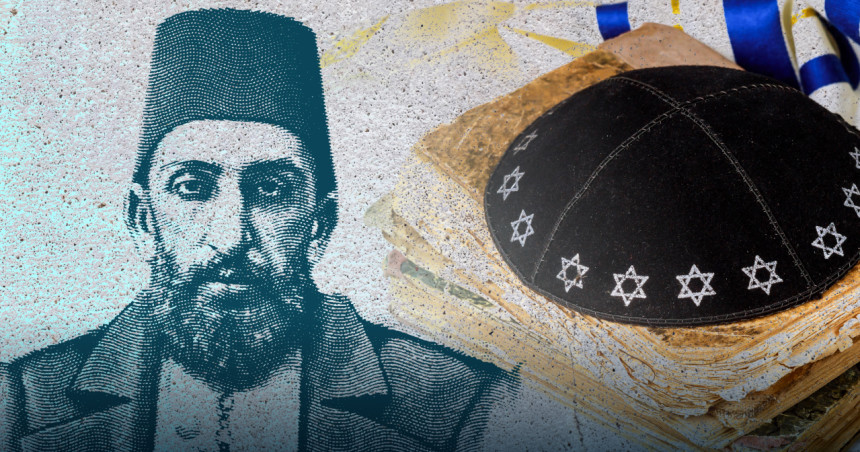Criticising Israel and its Zionist agenda in Palestine is globally silenced by equating it with anti-Semitism. We, as Muslims, reject this notion and emphasise that criticism of Zionism and Israel does not necessarily involve the intention to harm Jewish communities. Our history bears witness to this.
This article highlights just one example, namely that of one of the earliest opponents of Zionism: Sultan Abdul Hamid II.
Stepping back in time
From the 1870s onward, Zionist thinking gained momentum due to the increasing number of publications by European Jewish thinkers responding to the growing violence against Jews in Central and Eastern Europe.
Although the arrival of European Jewish refugees in Palestine had been causing unrest since the middle of that century, the project began to take serious shape when influential thinkers such as Theodor Herzl took concrete steps from the 1890s to convert Palestine into a Jewish state.
Abdul Hamid II was a staunch anti-Zionist
The European Zionists, however, had the misfortune of dealing with one of the most influential Ottoman sultans in decades, Abdul Hamid II, who ruled over Palestine from 1876 to 1909.
The Sultan was well aware of the Zionist plans and how they hoped to realise them. As an uncompromising ideologue, he stood firm and did not succumb to the tempting financial promises of Herzl and his Zionist group.
On the contrary, he did everything in his power to thwart the Zionist plans. Thus, he was a staunch anti-Zionist.
According to Herzl’s comrade Philipp Michael von Newlinski, the Sultan was even willing to sacrifice the blood of every Turkish soldier to retain control of Palestine. [1]
He was not at all anti-Jewish
On the contrary, many Jewish sources from that time, both Ottoman and non-Ottoman Jews, and even those of Western Zionists, emphasised his extraordinarily good care for his Jewish subjects.
Indeed, Sultan Abdul Hamid II proved as the first political leader that resistance against the desire of European Jews to colonise land in Palestine with European support and make it entirely Jewish is very possible without losing sight of the fact that other Jews are simply people with whom one can coexist, and whose rights should not be violated.
Jewish Encyclopaedia speaks highly of the Sultan
To illustrate the above, I will not make an effort to present a whole story in which, as an Islamic historian, I substantiate my position. I prefer to give the floor to the Jewish intellectuals of that time.
Between 1901 and 1906, during the reign of the Sultan but whilst in distant New York, some of these intellectuals wrote the renowned Jewish Encyclopaedia, which includes a section on Abdul Hamid II and his relationship with his Jewish subjects.
The following passage is written by Isaac Broydé, the respected late Jewish professor at the University of Paris and librarian of the Alliance Israélite Universelle.
ABD-UL-HAMID II.
“Thirty-fourth Ottoman sultan; born Sept. 22, 1842; succeeded his brother, Murad V., Aug. 31, 1876. The Turkish Jews rightly regard his reign as the inauguration and guarantee of their prosperous condition in the Turkish empire. Abd-ul-Hamid always showed the greatest solicitude for their welfare; and he was the first Turkish sovereign to grant them equality before the law with their Mohammedan fellow citizens.
“On ascending the throne, he ordered the payment of regular salaries to the Chief Rabbis of Turkey — giving them by that means the position of officials of state — and initiated the practice of sending to the Chief Rabbi of Constantinople every Passover the sum of 8,000 francs for distribution among the poor Jewish families of the Turkish capital.
“When, in 1881, the Cretan government refused to allow Jews to take part in the municipal elections, Abd-ul-Hamid annulled the elections and sharply admonished the authorities for their infringement of the rights of the Jews.
“When, by the terrible conflagration that occurred in the Jewish quarter, Haskeni, in 1882, six thousand Jewish families of Constantinople were left without shelter, Abd-ul-Hamid did everything in his power to relieve their distress.
“In 1883, when the sultan conferred the order of the Osmanie on the Chief Rabbi of Constantinople, Moses Levy, he expressed his sympathy for the Jews and his reprobation of the persecutions endured by them in many European countries. ‘As for me’, he said, ‘I am very much satisfied with the Jewish officials for their activity and zeal; and I will in the future increase their number.’ As a result of this promise, the entry of Jews to official life in Turkey is now less difficult than formerly.
“The Council of State includes one Jewish member, Behar Effendi Ashkenazi; in the diplomatic service there are about fifteen Jewish chancellors, consuls, and vice-consuls, representing Turkey abroad; at home a few Jews are at the head of provincial governments; while several have been honoured with the title of pasha — a title that until lately was never bestowed upon Jews.
“Quite recently the sultan showed his kindly feelings toward his Hebrew subjects by permitting persecuted Romanian Jews to settle in Asia Minor, granting them land and pecuniary aid.” [2]
To rightly criticise without hatred
The history of Islam and Muslims testifies from the earliest times that criticism of certain individuals, groups, communities, or nations is possible without it necessarily being accompanied by deep-seated hatred and aversion towards the larger whole to which the criticised belong.
Examples of this can already be found in the life of the ultimate inspiration for all Muslims who came after him, our Prophet Muhammad ﷺ.
As a dedicated Muslim, Sultan Abdul Hamid II also sought to follow in his footsteps (ﷺ). And in this regard, the Sultan did so successfully.
Today, Muslims will continue to resist injustice. We will continue to criticise the racist and violent ideology of Zionism and will not be silenced by unfounded accusations from advocates of that ideology.
No, anti-Zionism is not anti-Semitism, no matter how much Zionists may want it to be.
Action points
-
Highlight the work of figures like Sultan Abdul Hamid II and others who opposed Zionism without harbouring anti-Jewish sentiment.
-
Never stop rejecting the conflation of criticism of Zionism with anti-Semitism.
-
Encourage others to criticise Zionism whilst being cordial and kind towards Jews, following the example of Sultan Abdul Hamid II.
Source: Islam21c
Notes
[1] Lowenthal, M. (1962) The Diaries of Theodor Herzl. Dial Press.
[2] https://jewishencyclopedia.com/articles/211-abd-ul-hamid-ii










i really appreciate that efforts , Jazak Allah Khair.
Islam and its Khilafah do not have a history of anti-semitism. The shariah gurantees the rights of non Muslims/
Europe has a long and hate-filled history of anti-Semitism. Many expulsions and killings happened in various European lands. Britain banned Jews for 300 years, France expelled them too. Germany is infamous for their record.
The best guarantee for Jews and Christians is to live under a Khilafah state.